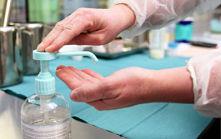US FDA bans 24 substances from healthcare antiseptics
Rulemaking deferred on six ingredients
10 January 2018
The US Food and Drug Administration (FDA) has issued a final rule, banning 24 antibacterial active ingredients from use in over-the-counter healthcare antiseptics, including triclosan and several iodine-based compounds.
Manufacturers have not submitted any data to support the substances as safe for use, the agency says. Under the final rule, the ingredients have been classified as not generally recognised as safe and effective (Gras/GRAE) for use. This means antiseptic products containing them will require approval as new drugs.
Manufacturers will have a year to comply with the rule by removing products from the market, or by substituting their antibacterial active ingredients.
The 24 substances are:
chlorhexidine gluconate
cloflucarban
fluorosalan
hexachlorophene
hexylresorcinol
iodophors (iodine-containing ingredients)
iodine complex (ammonium ether sulfate and polyoxyethylene sorbitan monolaurate)
iodine complex (phosphate ester of alkylaryloxy polyethylene glycol)
iodine tincture USP
iodine topical solution USP
nonylphenoxypoly (ethyleneoxy) ethanoliodine
poloxamer—iodine complex
undecoylium chloride iodine complex
mercufenol chloride
methylbenzethonium chloride
phenol
secondary amyltricresols
sodium oxychlorosene
tribromsalan
triclocarban
triclosan
triple dye
combination of calomel, oxyquinoline benzoate, triethanolamine and phenol derivative
combination of mercufenol chloride and secondary amyltricresols in 50% alcohol
Scope
The final rule will affect healthcare personnel hand washes and rubs, surgical hand scrubs and rubs, and patient antiseptic skin preparations. It does not apply to consumer antiseptic washes and rubs, first-aid antiseptics or those used by the food industry.
However, last year a similar FDA review of consumer antiseptic wash products led to the banning of 19 ingredients, including triclosan and triclocarban.
The FDA has deferred rulemaking for one year on six other ingredients. These are:
alcohol;
benzalkonium chloride;
benzethonium chloride;
chloroxylenol;
isopropyl alcohol; and
povidone-iodine.
This is to allow for the development and submission of new safety and effectiveness data on them.


